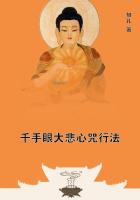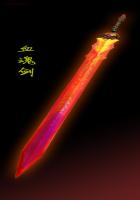"That's it," says the guide. "Drop the bridle, and leave it to the pownies. See for yourselves. I'm away on _my_ powny." He drops his bridle on the pommel of his saddle, whistles to his pony, and disappears in the mist; riding with his hands in his pockets, and his pipe in his mouth, as composedly as if he were sitting by his own fireside at home. We have no choice but to follow his example, or to be left alone on the moor. The intelligent little animals, relieved from our stupid supervision, trot off with their noses to the ground, like hounds on the scent. Where the intersecting tract of bog is wide, they skirt round it. Where it is narrow enough to be leaped over, they cross it by a jump. Trot! trot!--away the hardy little creatures go; never stopping, never hesitating. Our "superior intelligence," perfectly useless in the emergency, wonders how it will end. Our guide, in front of us, answers that it will end in the ponies finding their way certainly to the nearest village or the nearest house. "Let the bridles be," is his one warning to us. "Come what may of it, let the bridles be!" It is easy for the guide to let his bridle be--he is accustomed to place himself in that helpless position under stress of circumstances, and he knows exactly what his pony can do. To us, however, the situation is a new one; and it looks dangerous in the extreme. More than once I check myself, not without an effort, in the act of resuming the command of my pony on passing the more dangerous points in the journey. The time goes on; and no sign of an inhabited dwelling looms through the mist. I begin to get fidgety and irritable; I find myself secretly doubting the trustworthiness of the guide. While I am in this unsettled frame of mind, my pony approaches a dim, black, winding line, where the bog must be crossed for the hundredth time at least. The breadth of it (deceptively enlarged in appearance by the mist) looks to my eyes beyond the reach of a leap by any pony that ever was foaled. I lose my presence of mind. At the critical moment before the jump is taken, I am foolish enough to seize the bridle, and suddenly check the pony. He starts, throws up his head, and falls instantly as if he had been shot. My right hand, as we drop on the ground together, gets twisted under me, and I feel that I have sprained my wrist. If I escape with no worse injury than this, I may consider myself well off. But no such good fortune is reserved for me. In his struggles to rise, before I have completely extricated myself from him, the pony kicks me; and, as my ill-luck will have it, his hoof strikes just where the poisoned spear struck me in the past days of my service in India. The old wound opens again--and there I lie bleeding on the barren Shetland moor! This time my strength has not been exhausted in attempting to breast the current of a swift-flowing river with a drowning woman to support. I preserve my senses; and I am able to give the necessary directions for bandaging the wound with the best materials which we have at our disposal. To mount my pony again is simply out of the question. I must remain where I am, with my traveling companion to look after me; and the guide must trust his pony to discover the nearest place of shelter to which I can be removed. Before he abandons us on the moor, the man (at my suggestion) takes our " bearings," as correctly as he can by the help of my pocket-compass. This done, he disappears in the mist, with the bridle hanging loose, and the pony's nose to the ground, as before. I am left, under my young friend's care, with a cloak to lie on, and a saddle for a pillow. Our ponies composedly help themselves to such grass as they can find on the moor; keeping always near us as companionably as if they were a couple of dogs. In this position we wait events, while the dripping mist hangs thicker than ever all round us. The slow minutes follow each other wearily in the majestic silence of the moor. We neither of us acknowledge it in words, but we both feel that hours may pass before the guide discovers us again. The penetrating damp slowly strengthens its clammy hold on me. My companion's pocket-flask of sherry has about a teaspoonful of wine left in the bottom of it. We look at one another--having nothing else to look at in the present state of the weather--and we try to make the best of it. So the slow minutes follow each other, until our watches tell us that forty minutes have elapsed since the guide and his pony vanished from our view. My friend suggests that we may as well try what our voices can do toward proclaiming our situation to any living creature who may, by the barest possibility, be within hearing of us. I leave him to try the experiment, having no strength to spare for vocal efforts of any sort. My companion shouts at the highest pitch of his voice. Silence follows his first attempt. He tries again; and, this time, an answering hail reaches us faintly through the white fog. A fellow-creature of some sort, guide or stranger, is near us--help is coming at last! An interval passes; and voices reach our ears--the voices of two men. Then the shadowy appearance of the two becomes visible in the mist. Then the guide advances near enough to be identified. He is followed by a sturdy fellow in a composite dress, which presents him under the double aspect of a groom and a gardener. The guide speaks a few words of rough sympathy. The composite man stands by impenetrably silent; the sight of a disabled stranger fails entirely either to surprise or to interest the gardener-groom. After a little private consultation, the two men decide to cross their hands, and thus make a seat for me between them. My arms rest on their shoulders; and so they carry me off. My friend trudges behind them, with the saddle and the cloak. The ponies caper and kick, in unrestrained enjoyment of their freedom; and sometimes follow, sometimes precede us, as the humor of the moment inclines them. I am, fortunately for my bearers, a light weight. After twice resting, they stop altogether, and set me down on the driest place they can find. I look eagerly through the mist for some signs of a dwelling-house--and I see nothing but a little shelving beach, and a sheet of dark water beyond. Where are we? The gardener-groom vanishes, and appears again on the water, looming large in a boat. I am laid down in the bottom of the boat, with my saddle-pillow; and we shove off, leaving the ponies to the desolate freedom of the moor. They will pick up plenty to eat (the guide says); and when night comes on they will find their own way to shelter in a village hard by. The last I see of the hardy little creatures they are taking a drink of water, side by side, and biting each other sportively in higher spirits than ever! Slowly we float over the dark water--not a river, as I had at first supposed, but a lake--until we reach the shores of a little island; a flat, lonely, barren patch of ground. I am carried along a rough pathway made of great flat stones, until we reach the firmer earth, and discover a human dwelling-place at last. It is a long, low house of one story high; forming (as well as I can see) three sides of a square. The door stands hospitably open. The hall within is bare and cold and dreary. The men open an inner door, and we enter a long corridor, comfortably warmed by a peat fire. On one wall I notice the closed oaken doors of rooms; on the other, rows on rows of well-filled book-shelves meet my eye. Advancing to the end of the first passage, we turn at right angles into a second. Here a door is opened at last: I find myself in a spacious room, completely and tastefully furnished, having two beds in it, and a large fire burning in the grate. The change to this warm and cheerful place of shelter from the chilly and misty solitude of the moor is so luxuriously delightful that I am quite content, for the first few minutes, to stretch myself on a bed, in lazy enjoyment of my new position; without caring to inquire into whose house we have intruded; without even wondering at the strange absence of master, mistress, or member of the family to welcome our arrival under their hospitable roof. After a while, the first sense of relief passes away. My dormant curiosity revives. I begin to look about me. The gardener-groom has disappeared. I discover my traveling companion at the further end of the room, evidently occupied in questioning the guide. A word from me brings him to my bedside. What discoveries has he made? whose is the house in which we are sheltered; and how is it that no member of the family appears to welcome us? My friend relates his discoveries. The guide listens as attentively to the second-hand narrative as if it were quite new to him. The house that shelters us belongs to a gentleman of ancient Northern lineage, whose name is Dunross. He has lived in unbroken retirement on the barren island for twenty years past, with no other companion than a daughter, who is his only child. He is generally believed to be one of the most learned men living. The inhabitants of Shetland know him far and wide, under a name in their dialect which means, being interpreted, "The Master of Books." The one occasion on which he and his daughter have been known to leave their island retreat was at a past time when a terrible epidemic disease broke out among the villages in the neighborhood. Father and daughter labored day and night among their poor and afflicted neighbors, with a courage which no danger could shake, with a tender care which no fatigue could exhaust. The father had escaped infection, and the violence of the epidemic was beginning to wear itself out, when the daughter caught the disease. Her life had been preserved, but she never completely recovered her health. She is now an incurable sufferer from some mysterious nervous disorder which nobody understands, and which has kept her a prisoner on the island, self-withdrawn from all human observation, for years past. Among the poor inhabitants of the district, the father and daughter are worshiped as semi-divine beings. Their names come after the Sacred Name in the prayers which the parents teach to their children. Such is the household (so far as the guide's story goes) on whose privacy we have intruded ourselves! The narrative has a certain interest of its own, no doubt, but it has one defect--it fails entirely to explain the continued absence of Mr. Dunross. Is it possible that he is not aware of our presence in the house? We apply the guide, and make a few further inquiries of him.
同类推荐
Albert Savarus
One of the few drawing-rooms where, under the Restoration, the Archbishop of Besancon was sometimes to be seen, was that of the Baronne de Watteville, to whom he was particularly attached on account of her religious sentiments.汇聚授权电子版权。
热门推荐
TFBOYS星空下的承诺
这是一个发生在三位平凡女生身上的故事,也同时是发生在大学生活的一个故事,她们就像平凡的灰姑娘,希望可以找到自己的王子!但是,却困难重重!所以,希望大家可以和我一起,去欣赏他们从互不相干的活,变成白头偕老吧!















